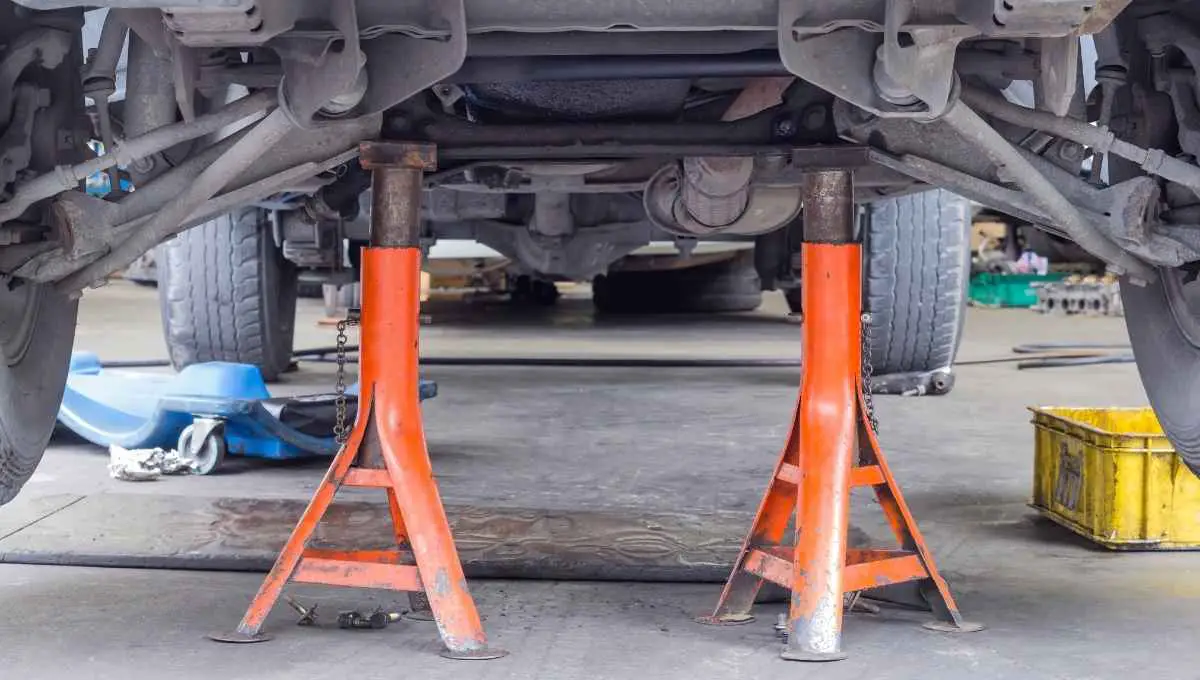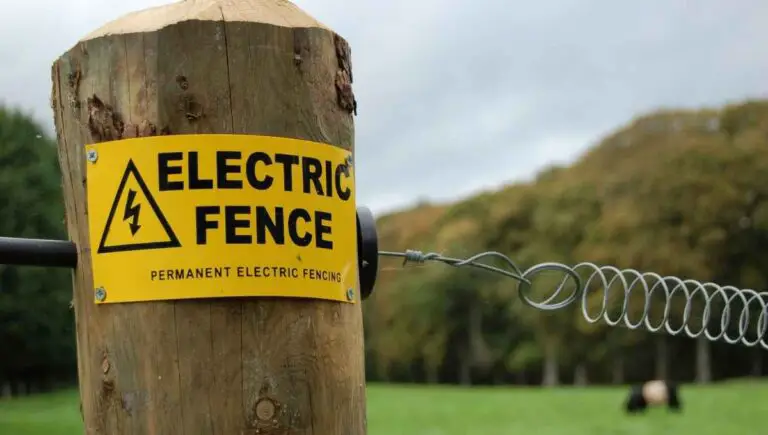Is It Illegal to Leave a Car on Jack Stands? (Do This First)

If you’ve been working on your car for a while, you might think it’s okay to take a break, leaving the car on jack stands. Before doing so, you need to consider the bylaws in your area and whether leaving a car on jack stands is legal or not.
Most cities prohibit you from leaving your car on jack stands in your driveway. This is because these cities will typically prohibit you from fixing your car at all in your driveway, let alone on a jack stand.
Yet, these bylaws vary greatly within each and every state. Therefore, you really need to do your research before you decide to fix your car in your driveway and additionally, leave it on jack stands.
We will let you know exactly why this is illegal and how you can avoid receiving any fines or tickets yourself.
This post contains affiliate links from Amazon and other stores. This means Yard Blogger may earn a commission if you make a purchase using any of our links. Please refer to our full affiliate disclosure policy for full details.
Here’s a Quick Pro Tip!
If you are lucky enough to live in an area that allows you to leave your car on jack stands, you’re going to need some solid jack stands to get the job done!
Here are some of our favorites from Amazon:
1. Heavy Duty Omega Lift – Perfect for larger automobiles
2. Pro-Lift Double Pin Jack – Great option for leaving your car on jacks for extended periods of time thanks to its double pin mechanism
The Laws Regarding Damaged Cars
Typically, if you have the skills and expertise to fix your car, you wouldn’t even think twice about doing it. Yet, some cities have very strict laws that refrain anyone from fixing their car on their own property.
Is It Illegal to Leave a Car on Jack Stands?
Some areas of the United States prohibit you to leave your car on a jack stand if it is in your driveway. If you do have to jack up your car, it can only be done within a certain amount of time.
If you live in an area that has strict car jack bylaws, you can either leave your car on a jack stand for up to seventy-two hours or not at all.
For example, municipalities in California have strict bylaws that state any inoperable car is not allowed on a driveway at all. If your car is broken, it needs to be taken to a mechanic.
On the other hand, you may live in an area where there are no bylaws regarding inoperable vehicles or specifically using car jacks in your driveway. This is more likely if you live in a rural area.
Can I Leave My Car Unattended on a Car Jack?
You are more likely allowed to leave your car on attended on a car jack if you live in a rural area. However, most cities have certain bylaws that do not permit you to leave your car on a car jack due to safety reasons.
Specific laws regarding car jacks are difficult to find because they fall under another category of inoperable vehicles. Essentially, if your car Is on a car jack, it is deemed inoperable.
Therefore, your car will now fall under the laws of having an inoperable vehicle on private property.
Some municipalities have no bylaws on whether or not you can have an inoperable vehicle on your property.
This is why you may find some properties that have a lot of broken-down cars on their property, usually in the backyard.
But, other municipalities do have very strict laws on this matter, typically in cities.
For example, in Grand Prairie, Texas, you are allowed to leave an inoperable vehicle on your private property for no longer than 29 consecutive days.
Can I Leave My Car on a Jack Stand Overnight in My Driveway?
You are typically allowed to leave your car on a jack stand overnight in your driveway if you plan to take it down within a day or two. Some areas have strict laws regarding how long you can have your car on a jack stand.
However, before you think of putting your car on a jack stand in the first place, you also need to check if there are any bylaws that permit you to fix your car in your own driveway.
If you are allowed, you should ensure that your car is secured to the jack stand so that it will not cause any accidents overnight.
You might also enjoy our post on What to Do if Your Neighbor Hit Your Parked Car
Can I Get a Fine for Leaving My Car Jacked up on My Driveway?
It is possible that you may get a fine for leaving your car jacked up on your driveway if your city does not permit you to do so. Consult with your local bylaws to see if you are allowed to fix your car in your driveway.
Some areas in the United States are very strict on what you can do with your car in your driveway and how long your car can be inoperable.
Therefore, it is important to check with your local bylaws to see if you are allowed to fix your car yourself in your driveway.
Can I Fight a Bylaw Ticket?
Typically bylaw tickets are given under rightful circumstances. It may not seem right to you but there are many bylaws that most citizens do not even know about until they get fined for them.
Most people are shocked to find a bylaw ticket for simply fixing your car in your driveway. Mechanics can be expensive and if you have the right assets to fix the car yourself, you’ll be tempted to do it.
However, there are specific bylaws in some areas of the United States that forbid you to fix your car in your driveway.
This is enforced for safety reasons and also for the nuisance that it may cause to your neighbors.
All About Inoperable Cars
Now that you have learned that inoperable cars are typically not allowed on private properties, let’s determine exactly what deems a car inoperable.
What Deems a Car Inoperable?
A car is deemed inoperable when it has been unfit to be driven on public roads for a certain amount of time. The amount of time will depend on your city’s bylaws.
In cities with strict bylaws regarding this matter, a car is typically deemed inoperable if it has been unfit to be driven for at least seven days.
Therefore, if your car has been on a car jack in your driveway for at least seven days, you will likely be fined for having an inoperable vehicle on your property.
Can You Have an Inoperable Car?
You’re more likely allowed to have an inoperable car on your property if you live in a rural area. But, on the other hand, most cities have stricter bylaws that do not allow you to have an inoperable car on your property.
So, it essentially comes down to where you live. If your car just broke, you may be allowed to quickly fix it before anyone notices, but you did not read that here.
However, some cities do allow you at least 72 hours to fix your car. Just make sure to check with your city’s bylaws that relate to inoperable cars.
Does a Flat Tire Make a Car Inoperable?
A flat tire does make a car inoperable if the tire has not been fixed within a certain amount of time. The amount of time will depend on where you live, but typically it is anywhere from 72 hours to 30 days.
Basically, a car is deemed inoperable when you cannot drive it legally on a public road. This can be anything from having parts removed or parts damaged.
If you are legally allowed to fix your flat tire on your driveway, you will likely have to do it within 72 hours.
But, some cities do not even allow you to fix your own car on your driveway, so ensure that you consult with your local bylaws before doing so.
You might also enjoy our post on If it is Illegal To Park Your Car in Your Backyard
What is Considered a Junk Vehicle?
A junk vehicle is any vehicle that has been deemed inoperable for a certain amount of time. A junk vehicle typically is in your driveway or in your backyard with no intentions of being fixed.
If you have ever driven out into the country, you have likely seen some properties with either one or more junk vehicles in their yard. These vehicles usually are rusted, missing tires, or have shattered windows.
Municipalities typically deem these vehicles as safety hazards since they attract rodents. Rodents can carry many harmful bacteria and parasites that are dangerous to humans.
Should You Leave a Car on Jack Stands, Anyways?
Regardless if it is legal or not, should you even leave your car on jack stands? We’ll discuss how long is too long in regards to the health of your car.
Is it Okay To Leave a Car on Jack Stands?
It is okay to leave your car on jack stands if your city’s bylaws permit you to do so. In regards to the health of your car, it is also okay to leave your car on jack stands if you have the jack stands in the right place.
If you are allowed to legally leave your car on jack stands in your driveway (check your local bylaws), your car should be fine for at least two weeks.
However, ensure that you have your jack stands properly placed on your car. If they are not properly placed, they may put some stress on the suspension.
But, in general, if your car is properly placed on your jack stands, leaving your car on them anywhere from two weeks to two months shouldn’t affect your car.
Is it Okay To Leave a Car Jacked Up Overnight?
If you live in an area where it is legal to leave your car jacked up overnight, this is okay. Additionally, if your car is properly attached to the jack stands, the car shouldn’t be affected by staying on the jack stands overnight.
Most cities allow you to fix your car yourself but you have to do it within 72 hours. Therefore, it is okay to leave your car on jack stands overnight.
However, some cities don’t allow you to fix your car at all, so ensure that you check with your local bylaws.
How Long Can I Keep My Car on a Jack?
If your car is properly attached to your jack stands, your car should be fine for at least two months. However, make sure that you check with your local bylaws to find out if you’re legally allowed to leave your car on a jack stand.
If you plan to leave your car jacked up for a long amount of time, you should frequently check on your car to make sure that it hasn’t shifted.
Changes in the weather, such as rain, wind, and snow, can cause your car to shift a little bit which may affect the suspension if it is jacked up for a long amount of time.
Is It Okay to Leave a Car Jacked up on One Side?
If your municipality allows you to have your car jacked up, it is okay to leave it up on one side. However, consider your surroundings before you do so. For example, if there are kids or dogs constantly running around, this isn’t a good idea.
If you have to leave your car jacked up on one side for a long amount of time, you should consider your surroundings before doing so.
Kids and dogs can be attracted to the car and try to climb it, without knowing better, which can cause the car to come off the jack stand and potentially cause some serious damage.
Can I Cover My Car That Is on a Jack Stand?
It is okay to cover your car that is on a jack stand as long as your municipality allows you to fix your car on your property. But, if you are just trying to hide your car from being on a jack stand, it likely won’t work.
If your municipality does not allow you to fix cars in your driveway, and you try to cover your car from being on a jack stand, unfortunately, it is just as obvious as if it wasn’t covered.
Your local traffic officer will very much likely notice your car cover and give you a ticket.
You might also enjoy our post on If You Need a Permit to Regrade Your Yard
Can You Fix Cars at Home?
Unfortunately, in some areas, it is illegal to fix your car at home. Fixing a car requires a certain license and if you do not have that license, you are working illegally, even if it is on your own car.
However, there are some certain repairs that you can do on your own that do not require this license:
- Oil and oil filter change
- Vehicle lubrication
- Puncture repair
- Replacement of brake parts
Additionally, these laws are enforced by each city, so consult with your city’s bylaws to find out if you can legally fix your car yourself at home.
Can I Run a Car Repair Business From Home?
You can absolutely run a car repair business from home as long as you have the proper licenses and approval from your municipality. However, if you don’t have any appropriate licenses, you would be working illegally.
Keep in mind that some states do not require any license or certification to become an auto mechanic, including Texas, New Jersey, and Florida.
In this case, you will have to check with your specific bylaws to find out if it is legal to fix cars in your neighborhood.
Other states, such as Michigan, have a very comprehensive licensing system with eleven categories for certification in automobile repair.
Can I Repair My Car on the Road?
Most cities will not allow you to repair your car on the road since it interferes with local traffic and may cause a nuisance to your surrounding neighbors. However, if you live in a rural area it is more likely that this will be allowed.
If you live in an area that does not allow you to repair your car on the road, you most likely are not allowed to repair your car on the driveway, either.
In this case, you should call a tow truck to have your car towed to a local mechanic to have your car legally fixed.
Can You Repair Cars at Home?
Some cities allow you to do certain minor repairs on your cars at home. Although, some cities do not allow you to do any repairs. Therefore, consult with your local bylaws to ensure what is allowed in your area.
Cities in California tend to have the strictest rules when it comes to repairing cars at home. For example, in Sacramento County, it is illegal to fix your car if you need any sort of tool that a normal homeowner wouldn’t have.
Sacramento County allows you to do minor repairs on your car but they further restrict you from using any tools not normally found in a residence.
Therefore, the city makes it next to impossible to fix your car.
Is It Illegal to Work on Your Own Car in Your Driveway?
Some cities do prohibit you from working on your car in your own driveway due to safety reasons and possible nuisance reasons that can be created for your neighbors.
Additionally, some cities do allow you to perform minor repairs on your car but you have to have them done typically within 72 hours.
If you need to do any other major repairs, this is typically not allowed unless you have a mechanical license.
What Is the Fine for Fixing Your Car in Your Driveway?
Fixing your car in your driveway is illegal in many areas. If you get caught doing this, you may be fined up to $500, possibly more depending on the situation.
For example, Sacramento County in California seems to have one of the strictest laws on fixing your cars in your driveway. A man got charged $450 for violating this code.
You might also enjoy our post on How to Fix a Muddy Driveway
Related Questions
How Do I Report My Neighbor’s Illegal Auto-Shop?
To report your neighbor’s illegal auto shop, you should contact either your local police station or your local council. You can do this by either submitting a report online or calling their office.
When your neighbor has an auto shop, it can create a lot of unnecessary noise and traffic in your neighborhood. Therefore, if you need to report it, contact your local police station or submit a form online.
They will investigate the situation and take the matter into their own hands.
What Can I Do About My Neighbor’s Broken Car in Their Driveway?
A broken car in your neighbor’s driveway can be an unsightly scene. If you believe that it is illegal for your neighbor to have a broken car in their driveway, you can inform them and hope that they will deal with the situation.
Bylaws regarding broken cars vary widely so it can be difficult to keep up with them. Let your neighbor know that what they are doing is illegal and you would appreciate it if they removed their car from their driveway.
If they refuse to, you can inform your local police station and let them know about the situation. Your neighbor will most likely move it once the police have been involved.
Final Thoughts
Although you may be extremely tempted to fix your car yourself, you should probably check with your local laws first to determine if you’re even legally allowed.
Keep in mind that these laws vary greatly within states and between states, so do your research to avoid any fines!







